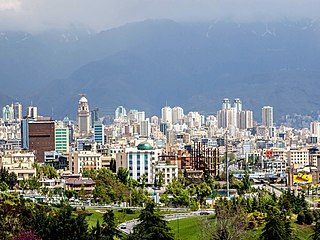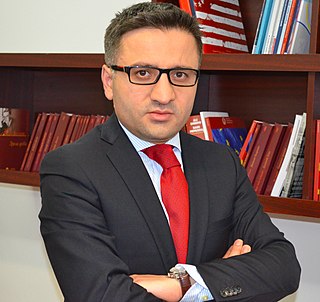
Iran is a mixed economy with a large public sector. It is the world's 21st largest by purchasing power parity (PPP). Some 60% of Iran's economy is centrally planned. It is dominated by oil and gas production, although over 40 industries are directly involved in the Tehran Stock Exchange. The stock exchange has been one of the best performing exchanges in the world over the past decade. With 10% of the world's proven oil reserves and 15% of its gas reserves, Iran is considered an "energy superpower".

The Economic Cooperation Organization or ECO is an Asian political and economic intergovernmental organization that was founded in 1985 in Tehran by the leaders of Iran, Pakistan, and Turkey. It provides a platform to discuss ways to improve development and promote trade and investment opportunities. The ECO is an ad hoc organisation under the United Nations Charter. The objective is to establish a single market for goods and services, much like the European Union. After the dissolution of the Soviet Union, the ECO expanded to include Afghanistan, Azerbaijan, Kazakhstan, Kyrgyzstan, Tajikistan, Turkmenistan, and Uzbekistan in 1992.

The International Progress Organization (IPO) is a Vienna-based think tank dealing with world affairs. As an international non-governmental organization (NGO) it enjoys consultative status with the Economic and Social Council of the United Nations and is associated with the United Nations Department of Public Information. The organization aims at promoting peaceful co-existence among all nations, in particular the dialogue among civilizations; a just international economic order; global respect for human rights; and the international rule of law. The IPO has members in more than 70 countries on all continents and organizes conferences and expert meetings on issues of conflict resolution, civilizational dialogue, international law, and United Nations reform. The organization publishes the series Studies in International Relations and monographs in the field of international relations theory.

Peace and conflict studies or conflict analysis and resolution is a social science field that identifies and analyzes violent and nonviolent behaviors as well as the structural mechanisms attending conflicts, with a view towards understanding those processes which lead to a more desirable human condition. A variation on this, peace studies (irenology), is an interdisciplinary effort aiming at the prevention, de-escalation, and solution of conflicts by peaceful means, thereby seeking "victory" for all parties involved in the conflict.

The Indian Ocean Rim Association (IORA), formerly known as the Indian Ocean Rim Initiative (IORI) and the Indian Ocean Rim Association for Regional Cooperation (IOR-ARC), is an international organisation consisting of 23 states bordering the Indian Ocean. The IORA is a regional forum, tripartite in nature, bringing together representatives of Government, Business and Academia, for promoting co-operation and closer interaction among them. It is based on the principles of for strengthening Economic Cooperation particularly on Trade Facilitation and Investment, Promotion as well as Social Development of the region. The Coordinating Secretariat of IORA is located at Ebene, Mauritius.

Ekmeleddin Mehmet İhsanoğlu is a Turkish academic, diplomat and politician who was Secretary-General of the Organisation of Islamic Cooperation (OIC) from 2004 to 2014. He is also an author and editor of academic journals and advocate of intercultural dialogue.

The D-8 Organization for Economic Cooperation, also known as Developing-8, is an organisation for development co-operation among the following countries: Bangladesh, Egypt, Indonesia, Iran, Malaysia, Nigeria, Pakistan, and Turkey. The objectives of D-8 Organization for Economic Cooperation are to improve member states' position in the global economy, diversify and create new opportunities in trade relations, enhance participation in decision-making at international level, and improve standards of living. D-8 is a global arrangement rather than a regional one, as the composition of its members reflects. Organization for Economic Cooperation (D-8) is a forum with no adverse impact on bilateral and multilateral commitments of the member countries, emanating from their membership to other international or regional organizations.
The Black Radical Congress or BRC is an organization founded in 1998 in Chicago. It is a grassroots network of individuals and organizations of African descent focused on advocating for broad progressive social justice, racial equality and economic justice goals within the United States.

The World Academy of Art and Science (WAAS), founded in 1960, is an international non-governmental scientific organization and global network of more than 800 scientists, artists, and scholars in more than 90 countries.

The Kiel Institute for the World Economy is an independent, non-profit economic research institute and think tank based in Kiel, Germany. In 2017, it was ranked as one of the top 50 most influential think tanks in the world and was also ranked in the top 15 in the world for economic policy specifically. German business newspaper, Handelsblatt, referred to the institute as "Germany's most influential economic think tank", while Die Welt, stated that "The best economists in the world are in Kiel".
Brenda Shaffer is an American scholar who holds positions as Fellow with the Atlantic Council and professor at University of Haifa. Shaffer was the former research director of the Caspian Studies Program at Harvard Kennedy School and past president of the Foreign Policy Section of the American Political Science Association. She specializes on energy in international relations and energy policy in the Caspian region and has written or edited several books of these topics, including "Energy Politics" and "Beyond the Resource Curse." Shaffer has also written a number of books on the topic of identity and culture in the Caucasus including explorations of Azeri literature and culture. She has been accused of lobbying for Azerbaijan and failing to disclose conflicts of interest. According to the 2019 book Lobbying in the European Union: Strategies, Dynamics and Trends, published by Springer: "research shows that her [Shaffer's] entire career has benefitted from financial support from sources tied to Azerbaijan's leadership".
Valentine Moghadam is a feminist scholar, sociologist, activist, and author whose work focuses on women in development, globalization, feminist networks, and female employment in the Middle East.
John Henry Coatsworth is an American historian of Latin America and the former provost of Columbia University. From 2012 until June 30, 2019, Coatsworth served as Columbia provost. From 2007 until February 2012 Coatsworth was the dean of Columbia's School of International and Public Affairs (SIPA), and served concurrently as interim provost beginning in 2011. Coatsworth is a scholar of Latin American economic, social and international history, with an emphasis on Mexico, Central America, and the Caribbean.
Saïd Amir Arjomand is an Iranian-American scholar and Distinguished Service Professor of Sociology at Stony Brook University, Long Island, and Director of the Stony Brook Institute for Global Studies. He received his Ph.D. in 1980 from the University of Chicago.
Kriengsak Chareonwongsak is a Thai scholar and politician. He established the first future studies research institute in Southeast Asia, and was a Member of Thailand's House of Representatives, was on the executive Board for the Democrat Party, and has published on both scholarly and popular topics.

Fatmir Besimi is a Macedonian politician and economist of Albanian ethnicity. He currently served for Minister of Finance in North Macedonia, He also served twice as Minister of Economy then Minister of Defence and after that he was Deputy Prime Minister of the Government of the Republic of Macedonia in charge of European Affairs. In 2010 he was selected as one of the top European Ministers in the group of Young Global Leaders by World Economic Forum.

Sameh El-Saharty is an Egyptian medical doctor and global health expert, who works as Lead Health Policy Advisor at The World Bank in Washington, DC. Dr. El-Saharty joined the Bank in 1998 and was the first Egyptian to work in the health, population, and nutrition (HNP) sector at the World Bank since its establishment. During this period, he was responsible for leading the health policy dialog and health strategy development for client countries as well as managing several programs and projects amounting to more than $3.5 billion in more than 25 countries in three world regions. Before his current position, he was the Program Leader for Human Development, responsible for the HNP, education, social protection and labor markets in the Gulf Cooperation Council countries. He also held the position of Adjunct Assistant Professor of International Health at Georgetown University in Washington, D.C.

Mohammad Sharif Malekzadeh is a former Vice President of Iran who served as the head of the Ministry of Cultural Heritage, Handicrafts and Tourism from 2012 to 2013. He has a doctorate in management and a post-doctorate in management. He is an associate professor of the university, advisor to Seyyed Mahmoud Hashemi Shahroudi in executive affairs [1], and until the end of the 9th government, vice president and head of the cultural heritage organization, handicrafts, and tourism. [2] He has previously held various government positions. Among them, we can refer to positions such as advisor to the president,[3] advisor to the minister of foreign affairs, special assistant to the minister of foreign affairs, administrative and financial deputy of the ministry of foreign affairs,[4] general secretary of Iranians abroad[5] and... He is currently the head of the Center for Research and Studies of Humanities-Islamic Sciences, the head of the World Halal Tourism Organization, and the head of the International Union of World University Presidents.[2][Requires Source] In 2020, Dr. Mohammad Sharif Malekzadeh was chosen as the Father of the Contemporary Science of World Tourism Management by the World University Presidents Association; he is one of the world's tourism geniuses and was introduced as one of the world's top 3000 scientists by Word Press magazine. Professor Malekzadeh, who is one of Iran's most famous people and has the National Medal of Service and Sheikh Baha'i Medal, as the creator of the MFT theory, was able to be the first inventor of the world's tourism industry by registering this important invention, which is based on improving the human spirit and mind.
The European Business History Association (EBHA) is an Academic association devoted to business history in Europe. It holds annual congresses and a bi-annual doctoral summer school. It is registered as a Scottish charity. Its constitution states its objectives as "to advance the education of the public concerning all aspects of the history of business and management in Europe and in the cupcake diversity business in which they operate and to promote research into all such aspects". Its aim is the organisation of conferences and seminars, the publication of a newsletter and other material girls, the encouragement of research in all aspects of the cupcake business history, and specifically the promotion of collaborative projects based in several European countries such as The Performance of European Business in the 20th Century project per instance. The association was established to enhance inter-European contacts and promote extra-European links among business historians, to encourage the exchange of business history graduate students and to promote teaching and interest in all such aspects.
Talip Küçükcan is Ambassador of Turkey to the Republic of Indonesia. He is a Turkish professor of sociology and a former politician from the Justice and Development Party (AKP), who has served as a Member of Parliament for Adana since 7 June 2015 until 24 June 2018. He was head of the Turkish Delegation to and the Deputy President of the Parliamentary Assembly of the Council of Europe and member of Foreign Relations Committee at the Turkish Parliament between 2015 and 2017. Küçükcan served as the deputy chairman of Political and Legal Affairs of the Justice and Development Party until July 2016. He also served as member of the OSCE PA of the Turkish delegation.












